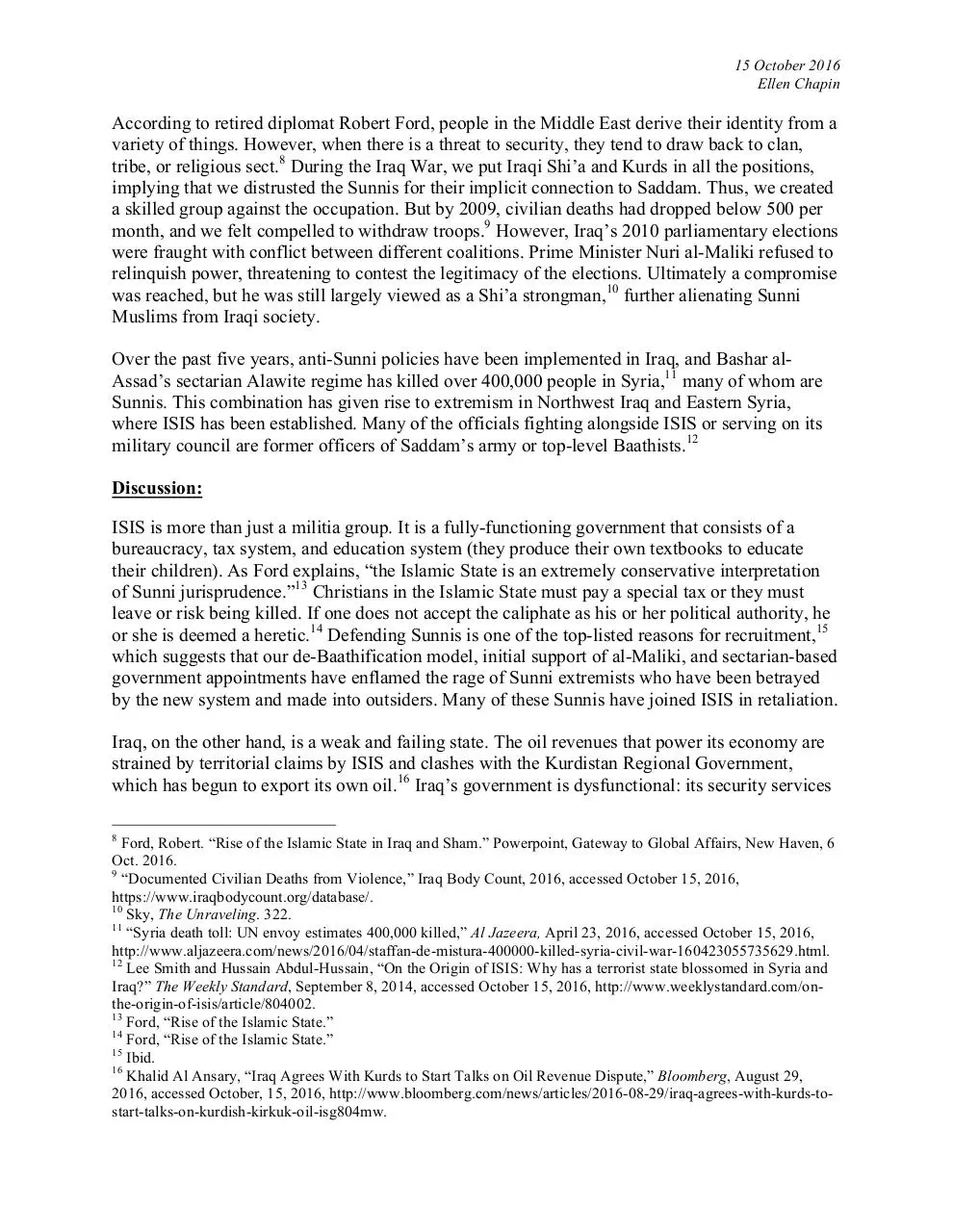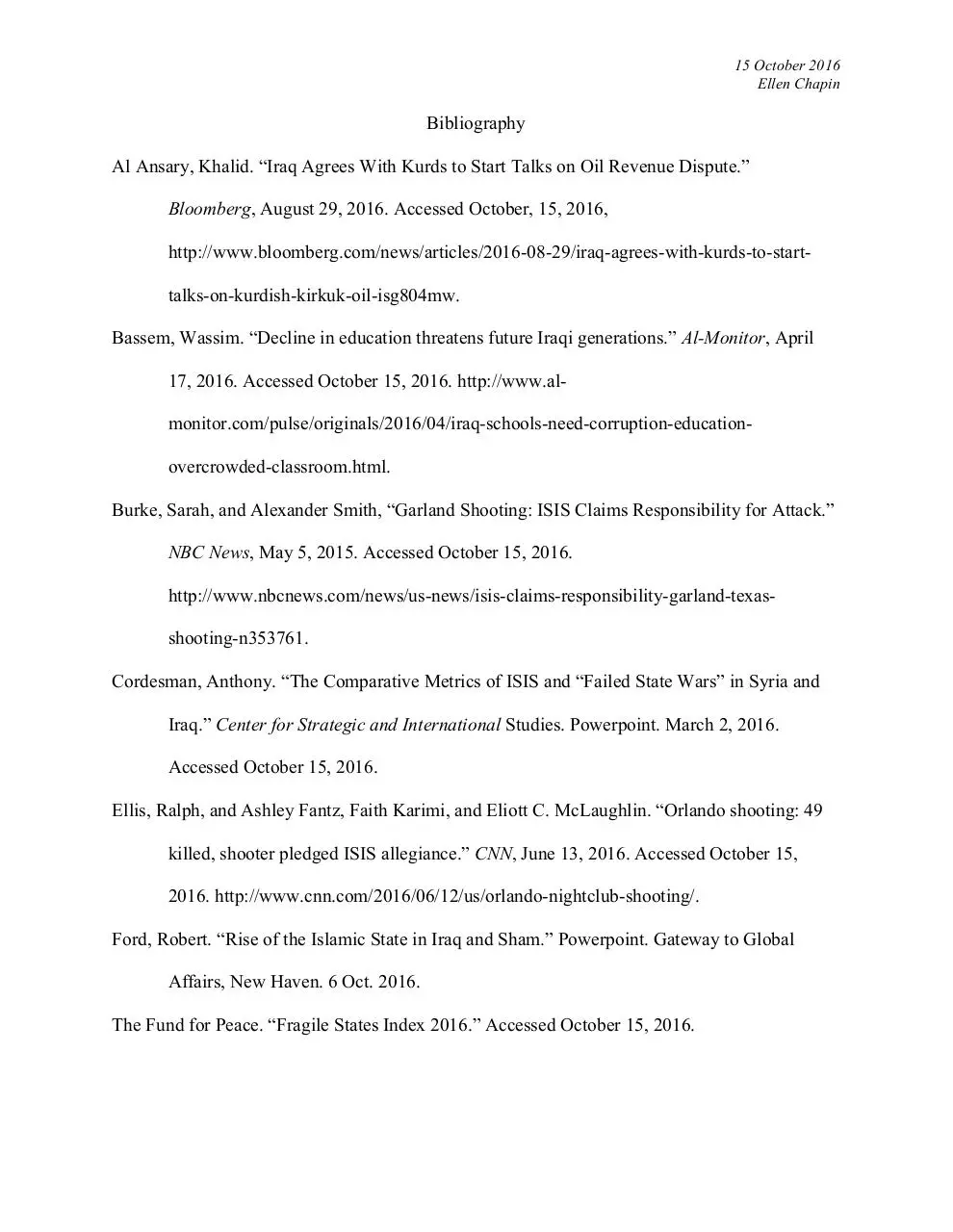MarianoStephens SecurityPolicyMemo (PDF)
File information
Title: Microsoft Word - Mariano+Stephens+Final+Draft+Policy+Memo.docx
This PDF 1.3 document has been generated by Word / Mac OS X 10.12.6 Quartz PDFContext, and has been sent on pdf-archive.com on 21/10/2017 at 02:56, from IP address 130.132.x.x.
The current document download page has been viewed 376 times.
File size: 138.63 KB (7 pages).
Privacy: public file





File preview
15 October 2016
Ellen Chapin
Action
MEMORANDUM FOR:
From:
Subject:
THE PRESIDENT
Mariano Stephens
Consequences and Opportunities of Restructuring Policy Towards
the Middle East: Strengthening Iraq to Ensure Political and
Economic Stability
Purpose:
This past Saturday, more than 50 people were killed in Baghdad as the result of ISIS attacks. The
attackers detonated explosives near a Shi’a gathering, just as Iraqi forces were preparing to
launch an attack on Mosul, Iraq’s last ISIS-controlled major city.1 Preserving stability in Iraq
should be the cornerstone of policy towards the Middle East. It is the fundamental actor with
the authority to uproot the Islamic State, which poses a direct threat to the United States through
its links to the Orlando,2 San Bernadino,3 and Garland attacks.4 The key finding of this
memorandum is that our end goal should be creating national identity, where sectarian divides
are rampaging. This can be achieved via promoting adequate political representation in the Iraqi
government and supporting economic stability.
Background:
The Middle East has been rife with violence for over a decade, particularly spiking upward
following our failed occupation of Iraq. Our focus was haphazardly modeled and involved
inadequate consultation with the Iraqi people. As Professor Emma Sky of Yale University
explains, the reconstruction failed because we placed Sunnis, and particularly Sunni Baathists,
outside of the political and economic system, which led to insurgency and unrest.5 In the late
2000s, the drivers of instability in Iraq were sectarian violence, al-Qaeda, Sunni insurgency,
Kurdish expansionism, and weak state institutions.6 Our political approach towards these factors
was flawed because the Iraqi public had no input in the interim constitution we created, and the
allocation of posts to the Governing Council was based on ethnicity and sect, which further
codified the divides that eroded a sense of Iraqi identity.7
1
Reuters, “Attacks by ISIS Kill Dozens in Iraq,” New York Times, October 15, 2016, accessed October 15, 2016,
http://www.nytimes.com/2016/10/16/world/middleeast/iraq-isis-attacks.html?ref=middleeast.
2
Ralph Ellis, Ashley Fantz, Faith Karimi, and Eliott C. McLaughlin, “Orlando shooting: 49 killed, shooter pledged
ISIS allegiance,” CNN, June 13, 2016, accessed October 15, 2016, http://www.cnn.com/2016/06/12/us/orlandonightclub-shooting/.
3
Meg Wagner, “ISIS claims responsibility for San Bernardino shooting that left 14 dead in online radio broadcast,”
New York Daily News, December 5, 2015, accessed October 15, 2016,
http://www.nydailynews.com/news/national/isis-claims-responsibility-san-bernardino-shooting-article-1.2456193.
4
Sarah Burke and Alexander Smith, “Garland Shooting: ISIS Claims Responsibility for Attack,” NBC News, May 5,
2015, accessed October 15, 2016, http://www.nbcnews.com/news/us-news/isis-claims-responsibility-garland-texasshooting-n353761.
5
Sky, Emma. The Unraveling: High Hopes and Missed Opportunities in Iraq. (New York: PublicAffairs, 2009), 57.
6
Sky, The Unraveling. 159-60
7
Sky, The Unraveling. 153.
15 October 2016
Ellen Chapin
According to retired diplomat Robert Ford, people in the Middle East derive their identity from a
variety of things. However, when there is a threat to security, they tend to draw back to clan,
tribe, or religious sect.8 During the Iraq War, we put Iraqi Shi’a and Kurds in all the positions,
implying that we distrusted the Sunnis for their implicit connection to Saddam. Thus, we created
a skilled group against the occupation. But by 2009, civilian deaths had dropped below 500 per
month, and we felt compelled to withdraw troops.9 However, Iraq’s 2010 parliamentary elections
were fraught with conflict between different coalitions. Prime Minister Nuri al-Maliki refused to
relinquish power, threatening to contest the legitimacy of the elections. Ultimately a compromise
was reached, but he was still largely viewed as a Shi’a strongman,10 further alienating Sunni
Muslims from Iraqi society.
Over the past five years, anti-Sunni policies have been implemented in Iraq, and Bashar alAssad’s sectarian Alawite regime has killed over 400,000 people in Syria,11 many of whom are
Sunnis. This combination has given rise to extremism in Northwest Iraq and Eastern Syria,
where ISIS has been established. Many of the officials fighting alongside ISIS or serving on its
military council are former officers of Saddam’s army or top-level Baathists.12
Discussion:
ISIS is more than just a militia group. It is a fully-functioning government that consists of a
bureaucracy, tax system, and education system (they produce their own textbooks to educate
their children). As Ford explains, “the Islamic State is an extremely conservative interpretation
of Sunni jurisprudence.”13 Christians in the Islamic State must pay a special tax or they must
leave or risk being killed. If one does not accept the caliphate as his or her political authority, he
or she is deemed a heretic.14 Defending Sunnis is one of the top-listed reasons for recruitment,15
which suggests that our de-Baathification model, initial support of al-Maliki, and sectarian-based
government appointments have enflamed the rage of Sunni extremists who have been betrayed
by the new system and made into outsiders. Many of these Sunnis have joined ISIS in retaliation.
Iraq, on the other hand, is a weak and failing state. The oil revenues that power its economy are
strained by territorial claims by ISIS and clashes with the Kurdistan Regional Government,
which has begun to export its own oil.16 Iraq’s government is dysfunctional: its security services
8
Ford, Robert. “Rise of the Islamic State in Iraq and Sham.” Powerpoint, Gateway to Global Affairs, New Haven, 6
Oct. 2016.
9
“Documented Civilian Deaths from Violence,” Iraq Body Count, 2016, accessed October 15, 2016,
https://www.iraqbodycount.org/database/.
10
Sky, The Unraveling. 322.
11
“Syria death toll: UN envoy estimates 400,000 killed,” Al Jazeera, April 23, 2016, accessed October 15, 2016,
http://www.aljazeera.com/news/2016/04/staffan-de-mistura-400000-killed-syria-civil-war-160423055735629.html.
12
Lee Smith and Hussain Abdul-Hussain, “On the Origin of ISIS: Why has a terrorist state blossomed in Syria and
Iraq?” The Weekly Standard, September 8, 2014, accessed October 15, 2016, http://www.weeklystandard.com/onthe-origin-of-isis/article/804002.
13
Ford, “Rise of the Islamic State.”
14
Ford, “Rise of the Islamic State.”
15
Ibid.
16
Khalid Al Ansary, “Iraq Agrees With Kurds to Start Talks on Oil Revenue Dispute,” Bloomberg, August 29,
2016, accessed October, 15, 2016, http://www.bloomberg.com/news/articles/2016-08-29/iraq-agrees-with-kurds-tostart-talks-on-kurdish-kirkuk-oil-isg804mw.
15 October 2016
Ellen Chapin
are corrupt and its ministries are “incapable of executing budgets.”17 According the the
Worldwide Governance Indicators, Iraq ranked below the 15th percentile for Voice and
Accountability, below the 10th percentile for Government Effectiveness and Regulatory
Quality, and below the 5th percentile for Political Stability and Absence of
Violence/Terrorism, Rule of Law, and Control of Corruption.18 The Fund for Peace’s annual
Fragile States Index for 2016 lists Iraq on “High Alert,” ranking it the 11th-most fragile state.19
Iraq’s education system is in tatters. Classrooms are described as “extremely packed and
overcrowded.” In 2015, the Ministry of Education announced the need of over 9,000 new
schools. Current schools are in a state of disrepair, lacking air conditioning and ventilation as
temperatures soar beyond 100 degrees Fahrenheit, leaving students at an even greater risk of
contracting infectious diseases.20 Rampant corruption has squandered existing funds for schools;
only 6% of al-Maliki’s 150 million-dollar education fund was used.21
A U.S. policy geared towards Iraqi stability must consider sustainability in all its decisions.
Simply eradicating ISIS from Iraqi territory is unlikely to improve conditions. After all, we
thought that uprooting Saddam’s Iraq would create a new and improved democracy, but today
Iraq is in an even worse state. Its government is dysfunctional and its northern borders are so
fraught with violence that the existence of Iraq as a clearly-demarcated entity is in question.
Indeed, removing ISIS via sheer military might is not a sustainable solution. An article from The
Atlantic cites “under-the-radar” NGOs and human-rights workers who have been documenting
the slaughter of Sunnis in the ISIS-controlled region of Iraq. They’ve found that anti-ISIS forces
may be killing just as many Sunnis as ISIS has.22 Many Sunnis continue to disappear at the hands
of the Iraqi army. Shi’a militias are often just as gruesome towards Sunnis as ISIS. Why
shouldn’t we expect this to continue even in a post-ISIS environment? Creating an Iraq that is an
alternative to ISIS is a tall order, and requires the end of anti-Sunni policy. Otherwise, another
extremist group would likely emerge from the post-ISIS power vacuum.
National identity must be created in Iraq, and that requires Sunnis to have the ability to prosper
in Iraqi society. The Awakening, in which Sunni insurgents took their arms against al-Qaeda in
return for our support, was fundamental to the organization’s defeat in the late 2000s. However,
we have not fulfilled many of the promises we made to insurgents regarding Sunni political
inclusion. We supported al-Maliki in the 2010 elections, even though the non-sectarian Iraqiya
coalition was clearly victorious. Sunni Arabs who were part of Iraqiya were either given
miniscule authority in Maliki’s government or were “effectively purged” from politics.23 We
must promote coalitions like Iraqiya in the upcoming 2018 elections. While Iraqiya no longer
17
Cordesman, Anthony, “The Comparative Metrics of ISIS and “Failed State Wars” in Syria and Iraq.” Center for
Strategic and International Studies. Powerpoint. March 2, 2016, accessed October 15, 2016.
18
“Worldwide Governance Indicators,” The World Bank Group, 2016, accessed October 15, 2016.
19
“Fragile States Index 2016,” The Fund for Peace, 2016, accessed October 15, 2016.
20
Wassim Bassem, “Decline in education threatens future Iraqi generations,” Al-Monitor, April 17, 2016, accessed
October 15, 2016, http://www.al-monitor.com/pulse/originals/2016/04/iraq-schools-need-corruption-educationovercrowded-classroom.html.
21
Ibid.
22
Anand Gopal, “The Hell After ISIS,” The Atlantic, May 2016, accessed October 15, 2016,
http://www.theatlantic.com/magazine/archive/2016/05/the-hell-after-isis/476391/.
23
Ali Khedery, “Why we stuck with Maliki — and lost Iraq,” The Washington Post, July 3, 2014, accessed October
15, 2016, https://www.washingtonpost.com/opinions/why-we-stuck-with-maliki--and-lostiraq/2014/07/03/0dd6a8a4-f7ec-11e3-a606-946fd632f9f1_story.html?utm_term=.4d7374ac7954.
15 October 2016
Ellen Chapin
exists, secular coalitions are essential for Iraqi stability. Many Sunnis join ISIS because they feel
that they have no representation in Iraq. The United States must employ diplomatic efforts to
ensure that Iraqi elections include representation of the Sunni population, and that any Iraqi
government must not have specific requirements for Sunni politicians in its cabinet. Such a
government must also accept Sunni dissent and the Sunni perspective as a whole.
Economic stability is another crucial element to a nation’s sustainability. Many unstable nations
in the Middle East, particularly states involved with the Arab Spring, are challenged by the lack
of economic opportunities that are available to their citizens. Forty-nine percent of Iraqis
disagree with the notion that there are good jobs near them.24 If people are unable to feed their
families, unrest will take over if they see no other option. The Iraqi economy is far too sensitive
to oil price shocks, as oil revenues make up 43% of GDP and 99% of exports.25 Iraq needs an
economic transition that focuses more on the domestic market and fostering a consumer society,
so that export-driven growth can be replaced with internal consumption and manufacturingdriven growth. To help spur sustainable growth, the government needs more resources in its
coffers to create social safety nets and provide tax cuts to allow more disposable income for Iraqi
citizens. Our role in strengthening the Iraqi economy is to encourage U.S. firms to invest in
Iraq. General Electric just signed a $1 billion contract to upgrade the nation’s electricity
infrastructure.26 If we provide tax incentives for companies to do work in Iraq that helps support
the nation’s infrastructure, the Iraqi government will have the necessary resources to implement
policies that promote growth outside of the oil industry. Furthermore, the Iraqi government will
have more resources for education, which will save the youngest generation from the perils of
economic malaise that make groups like ISIS more attractive. A healthy Iraqi economy is
fundamental to U.S. interests because it gives Iraq the tools to combat ISIS in ways beyond
military action.
Recommendation:
A new policy towards the Middle East must resolve the mistakes we have made in the past, and
there is no place where we have made more mistakes than Iraq. I recommend our sincere
dedication to ensuring that the next elections in Iraq are not only fair, but result in a parliament
defined by Iraqi national identity rather than sectarian division. With the help of our diplomacy
and coalition-building, the Iraqi people can establish a more peaceful government on their own.
Our work must also, however, support the future of Iraq, which is determined by more than the
next iteration of executive power or legislative assembly. We must encourage economic
investment in Iraq, so that it can depend less on oil and create an economy of domestic-led
growth. This creates a much better alternative to ISIS than the current Iraq. This policy promotes
an inclusive system that mitigates the tensions that characterize the instability that we see today.
An Iraq with the strength to fight ISIS is fundamental to the security of the United States, and
our foreign policy should be guided by this conclusion.
24
Ford, “Rise of the Islamic State.”
Luay Al-Khatteeb, “Iraq’s Economic Reform for 2016,” The Brookings Institution, December 13, 2015, accessed
October 15, 2016, https://www.brookings.edu/opinions/iraqs-economic-reform-for-2016/.
26
Sarah Kent and Ali Nabhan, “Some International Companies Cautiously Return to Iraq,” The Wall Street Journal,
August 15, 2016, accessed October 15, 2016, http://www.wsj.com/articles/some-international-investors-cautiouslyreturn-to-iraq-1471292606.
25
15 October 2016
Ellen Chapin
Bibliography
Al Ansary, Khalid. “Iraq Agrees With Kurds to Start Talks on Oil Revenue Dispute.”
Bloomberg, August 29, 2016. Accessed October, 15, 2016,
http://www.bloomberg.com/news/articles/2016-08-29/iraq-agrees-with-kurds-to-starttalks-on-kurdish-kirkuk-oil-isg804mw.
Bassem, Wassim. “Decline in education threatens future Iraqi generations.” Al-Monitor, April
17, 2016. Accessed October 15, 2016. http://www.almonitor.com/pulse/originals/2016/04/iraq-schools-need-corruption-educationovercrowded-classroom.html.
Burke, Sarah, and Alexander Smith, “Garland Shooting: ISIS Claims Responsibility for Attack.”
NBC News, May 5, 2015. Accessed October 15, 2016.
http://www.nbcnews.com/news/us-news/isis-claims-responsibility-garland-texasshooting-n353761.
Cordesman, Anthony. “The Comparative Metrics of ISIS and “Failed State Wars” in Syria and
Iraq.” Center for Strategic and International Studies. Powerpoint. March 2, 2016.
Accessed October 15, 2016.
Ellis, Ralph, and Ashley Fantz, Faith Karimi, and Eliott C. McLaughlin. “Orlando shooting: 49
killed, shooter pledged ISIS allegiance.” CNN, June 13, 2016. Accessed October 15,
2016. http://www.cnn.com/2016/06/12/us/orlando-nightclub-shooting/.
Ford, Robert. “Rise of the Islamic State in Iraq and Sham.” Powerpoint. Gateway to Global
Affairs, New Haven. 6 Oct. 2016.
The Fund for Peace. “Fragile States Index 2016.” Accessed October 15, 2016.
15 October 2016
Ellen Chapin
Gopal, Anand. “The Hell After ISIS.” The Atlantic, May 2016. Accessed October 15, 2016.
http://www.theatlantic.com/magazine/archive/2016/05/the-hell-after-isis/476391/.
Iraq Body Count. “Documented Civilian Deaths from Violence.” Accessed October 15, 2016.
https://www.iraqbodycount.org/database/.
Kent, Sarah, and Ali Nabhan. “Some International Companies Cautiously Return to Iraq.” The
Wall Street Journal, August 15, 2016. Accessed October 15, 2016,
http://www.wsj.com/articles/some-international-investors-cautiously-return-to-iraq1471292606.
Al-Khatteeb, Luay. “Iraq’s Economic Reform for 2016.” The Brookings Institution, December
13, 2015. Accessed October 15, 2016. https://www.brookings.edu/opinions/iraqseconomic-reform-for-2016/.
Khedery, Ali. “Why we stuck with Maliki — and lost Iraq.” The Washington Post, July 3, 2014.
Accessed October 15, 2016. https://www.washingtonpost.com/opinions/why-we-stuckwith-maliki--and-lost-iraq/2014/07/03/0dd6a8a4-f7ec-11e3-a606946fd632f9f1_story.html?utm_term=.4d7374ac7954.
Reuters. “Attacks by ISIS Kill Dozens in Iraq.” New York Times, October 15, 2016. Accessed
October 15, 2016. http://www.nytimes.com/2016/10/16/world/middleeast/iraq-isisattacks.html?ref=middleeast.
Sky, Emma. The Unraveling: High Hopes and Missed Opportunities in Iraq. New York:
PublicAffairs, 2009.
Smith, Lee, and Hussain Abdul-Hussain. “On the Origin of ISIS: Why has a terrorist state
blossomed in Syria and Iraq?” The Weekly Standard, September 8, 2014. Accessed
October 15, 2016. http://www.weeklystandard.com/on-the-origin-of-isis/article/804002.
15 October 2016
Ellen Chapin
“Syria death toll: UN envoy estimates 400,000 killed.” Al Jazeera, April 23, 2016. Accessed
October 15, 2016. http://www.aljazeera.com/news/2016/04/staffan-de-mistura-400000killed-syria-civil-war-160423055735629.html.
Wagner, Meg. “ISIS claims responsibility for San Bernardino shooting that left 14 dead in online
radio broadcast.” New York Daily News, December 5, 2015. Accessed October 15, 2016.
http://www.nydailynews.com/news/national/isis-claims-responsibility-san-bernardinoshooting-article-1.2456193.
The World Bank Group. “Worldwide Governance Indicators.” Accessed October 15, 2016.
Download MarianoStephens SecurityPolicyMemo
MarianoStephens_SecurityPolicyMemo.pdf (PDF, 138.63 KB)
Download PDF
Share this file on social networks
Link to this page
Permanent link
Use the permanent link to the download page to share your document on Facebook, Twitter, LinkedIn, or directly with a contact by e-Mail, Messenger, Whatsapp, Line..
Short link
Use the short link to share your document on Twitter or by text message (SMS)
HTML Code
Copy the following HTML code to share your document on a Website or Blog
QR Code to this page

This file has been shared publicly by a user of PDF Archive.
Document ID: 0000687528.